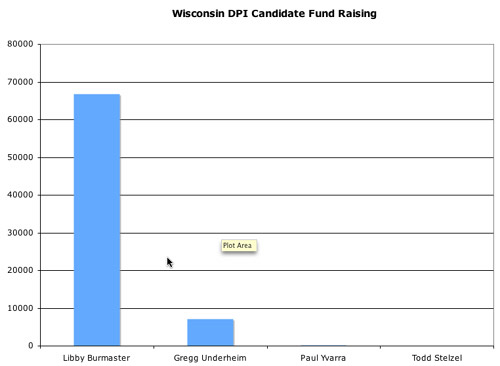Let the School Board know how you feel about the following at comments@madison.k12.wi.us.
Monday, February 7, 2005, I spoke before the School Board during public appearances. The purpose of my statement was to speak about my concern re. the School Board’s ongoing inaction regarding the fine arts curriculum. During the past six years, there have been cuts to courses, reduced positions, continued threats of cuts to curriculum (such as the elementary strings academic classes) without any engagement or dialogue with the hundreds of concerned community members who have voiced their support for a strong fine arts curriculum and have asked (over and over) for the School Board to work collaboratively with the community to develop a fine arts vision and strategy for fine arts.
If the fine arts curriculum were being treated fairly in light of the District’s overall financial challenges, that would be one thing. But this academic discipline has not been treated fairly and in some cases analyses and a board member’s recommendation are made that appear spiteful (for example, a $500-600 fee for the elementary strings academic classes that are part of the School Board approved Grade 4-12 instrumental curriculum). In the fall the District formed a working group with supporters of extracurricular sports. What’s wrong with this picture? Fine arts is also a great way to explore and develop community partnerships.
I believe the City of Madison and its fine arts community need to be seriously concerned with the District’s continued lack of attention to this important curriculum area and the absence of leadership by the School Board to �think outside the box.� Board members are allowing this curriculum to wither even in light of research showing the positive effect on low income student achievement and have missed opportunities for federal funding of the arts for low income children.
On Monday, I was “politely” told that I should be the one to remind board committee chairs to follow up with items on their agenda. What kind of foolishness is this? Each board committee has a support person from district staff who should review this information with the committee and provide periodic updates – publicly, since the public is expecting follow-up.
This follow-up and continuity is not happening. For example, in March 2003 the Fine Arts coordinator provided an overview of fine arts curriculum and community relationships between MMSD and the community to the Performance and Achievement Committee. Board members asked for a follow-up the next year. This did not happen. During the year, I contacted the Fine Arts Coordinator and asked about progress on a Fine Arts strategy. He informed me that his superiors would tell him when to work on this – they never did. Does that mean the public needs to take note of tasks assigned or commitments made publicly at a meeting and follow whether the statements are being followed up? No way.
I also reminded the School Board that the superintendent said that in the absence of a Fine Arts Coordinator, he had told the board a committee of teachers would be put together to handle tasks. Rather than address my concern, I was “politely” told (dismissed) about how it’s taken so long to find a Fine Arts Coordinator, because the District wants the best person for the position. I say hogwash. The District waited 5 months before even putting up an ad for the position when the outreach portion existed.
Are community members supposed to let the School Board know the teachers’ committee is not in place, there has been no posting for the Fine Arts Coordinator position and MMSD positions on fine arts boards are going unfilled because there is no Fine Arts coordinator and another options is needed? The fine arts teachers did just that in early fall – no action by the School Board.
The Board says they are making an effort to find the best person. Yet, the District abandoned the first interview process that included qualified candidates, lowered the standards (removed a licensing requirement) and re-announced the position. Ads were only placed in newspapers. When asked if the District had placed ads with professional organizations that would know how to contact qualified personnel, the District said they did not have the time to do that. (note: many employers advertise online for positions
these days – www.monster.com is the place to be, generally).
Why does the public have to follow up with everything? Why can’t we have confidence that appropriate steps are being taken? Why are there no mechanisms in place for the Board to provide appropriate oversight?
By his actions (and inactions) the Superintendent continues to show a lack of understanding of the demonstrated positive benefits of fine arts curriculum on student achievement, and fails to reach out to the community to keep the arts strong in Madison�s schools, which is something the community deeply values. In times of scarce resources, the district needs to work collaboratively with the community.
In the area of Fine Arts, it appears the Superintendent needs closer supervision by the Board. Yet, the School Board is not providing oversight either. Maybe I’m being too cranky. Afterall, what difference does it make if the Board abandons fine arts? Plenty.
What are the risks of not doing this? The board runs the risk of missing an important opportunity to improve student achievement and build community relationships with a community that strongly values the arts. Also, the board runs the risk of the district not remaining competitive with surrounding districts that have strong fine arts curriculum for their students. This would be an additional burden and negative impact on our low income students whose families do not have the opportunity to move to the suburbs. We can�t let this happen. Our children’s learning deserves more responsibility and accountability from our School Board.
How does the School Board expect the community to support a referendum when there is inaction year after year? They won�t if the public is not confident in the board’s ability to keep our school district strong by reflecting community values.
Specific comments in my statement included:
A. School Board is Non-responsive to the Community.
For three years, children, parents and members of the Madison community have spoken to board members about the important contribution of the fine arts curriculum to successful learning in core academic subject areas. While the School Board forms community committees to address community concerns about long-term planning, extracurricular sports, afterschool, and even school animals, the requests of hundreds of children, teachers and community members over the past three years for such a committee for fine arts curriculum planning go unanswered.
Abandoned promises. While looking for a new Fine Arts Coordinator, the School Board has let 9 months pass without professional support in the fine arts area for teachers and as a liaison with the community. Yet, the Superintendent said a committee of fine arts teachers would be put into place � this did not happen, and there was no follow-up publicly from the Board even after fine arts teachers spoke to the School Board about needing help last fall. Teachers even provided the School Board with possible solutions.
What has this meant? Diminished Community Outreach. There has been less community outreach and communication between the District and the arts community than in previous years. Representatives from the district�s fine arts professionals have not been on boards. I can only believe that if you had asked any of the fine arts teachers who are experienced professionals (many are involved in the community) to be on these boards, they would have been honored to serve. Even if you need to pay for time, the money would have been well spent.
Diminished Long-Term Planning for the Arts. MMSD lacks a fine arts vision that can only be developed with teacher, administrator, and community involvement. Long-term planning for the fine arts curriculum � looking at what currently exists, and what is needed for maintenance and growth of a strong fine arts curriculum is non-existent.
B. Missed Funding Opportunities.
In July, the Secretary of Education sent all school district superintendents a policy letter on fine arts curriculum. His letter began,
�As I am sure you know, the arts are a core academic subject under the No Child Left Behind Act (NCLB). I believe the arts have a significant role in education both for their intrinsic value and for the ways in which they can enhance general academic achievement and improve students’ social and emotional development.�
While we can all agree that we have philosophical and financial issues with NCLB, the points made in the Secretary�s letter reflect the current knowledge, key strengths and benefits to math and reading about fine arts education. His letter also went on to provide links to flexibility in federal grants for fine arts curriculum for low income students and all students and provided links to resources and to research showing independently evaluated improved test scores for low income children. This funding has been available for several years � MMSD�s former fine arts coordinator was not included in grant applications at federal level for fine arts. This is not something you would not undertake independently.
C. Community Enagagement/Partnering
How much longer is the School Board willing to let the District�s fine arts curriculum wither? If resources are as scarce as the School Board continues to warn the public, then action is needed yesterday. Our community values fine arts � that�s clear to everyone. Fine arts curriculum directly benefits children�s performance in school � achievement.
Other districts nationally are independently assessing the proven benefits of fine arts curriculum for low income children�s learning and academic achievement. They are seeing improved results in their test scores. How long is the School Board willing to risk these benefits to Madison�s children?
What�s needed? I believe the Board needs a Fine Arts working group under the Partnership Committee with feedback to the Performance and Achievement Committee. This committee must a) review what exists � existing approved curriculum and standards, b) develop a vision and action plan for fine arts that will lead to a strong fine arts curriculum for our children c) determine costs and d) identify partnerships. I would recommend the first step for the group would be to develop a work plan for board approval. I believe the Fine Arts Coordinator needs to lead this, but I asked the Board to begin now. Even though the Fine Arts Coordinator might be new, there are people with vast experience in this field and strong community ties who can help get up and going and provide the support the Fine Arts Coordinator will need when they are on board.
What are the risks of not doing this? The board runs the risk of missing an important opportunity to improve student achievement. Also, the board runs the risk of the district not remaining competitive with surrounding districts that have strong fine arts curriculum for their students. This would be an additional burden and negative impact on our low income students whose families do not have the opportunity to move around. We can�t let this happen.









